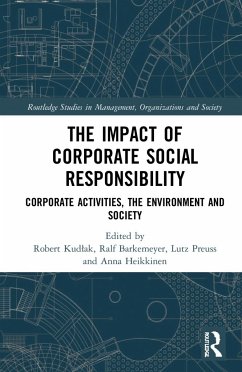
Ethics, Misconduct and the Financial Services Industry
Towards a Theory of Moral Business
Versandkostenfrei!
Versandfertig in 6-10 Tagen
45,99 €
inkl. MwSt.
Weitere Ausgaben:

PAYBACK Punkte
23 °P sammeln!
This book explores how ethics and the moral context of business have evolvedhistorically in inf luential management theories and concepts. It looks at howmanagerial thought accommodates morality, values, and ethics and demonstratesthe emerging patterns of ethical conduct to illustrate how moral aspectsof management and organizational practice can become peripheral.The author examines a diverse range of data sources such as the most seminalbooks in management and academic papers published in the mainstreamacademic literature. The readings selected in the process are subject to criticalanalysis ...
This book explores how ethics and the moral context of business have evolved
historically in inf luential management theories and concepts. It looks at how
managerial thought accommodates morality, values, and ethics and demonstrates
the emerging patterns of ethical conduct to illustrate how moral aspects
of management and organizational practice can become peripheral.
The author examines a diverse range of data sources such as the most seminal
books in management and academic papers published in the mainstream
academic literature. The readings selected in the process are subject to critical
analysis and are complemented by an exploratory study of the financial services
industry, based on semistructured in-depth interviews. The uniqueness of the
proposed approach comes first from the consolidation of many perspectives
such as management, organization studies, and business anthropology rather
than focusing on one particular subdiscipline; second, from using a mixed
methodology, combining literature reviews with empirical, exploratory research
based on interviews; and third from including a narrative context in the
analysis and proposed future theory framework.
This book will appeal to students, researchers, and scholars who teach ethics
in the fields of economics or business. It is useful for advancing theory and
research on moral management and as a resource for management practitioners
looking to create business practices fostering moral sensitivity. Those interested
in setting future development directions may also find the proposed
consolidation of theoretical and empirical evidence valuable for the design of
future policies.
historically in inf luential management theories and concepts. It looks at how
managerial thought accommodates morality, values, and ethics and demonstrates
the emerging patterns of ethical conduct to illustrate how moral aspects
of management and organizational practice can become peripheral.
The author examines a diverse range of data sources such as the most seminal
books in management and academic papers published in the mainstream
academic literature. The readings selected in the process are subject to critical
analysis and are complemented by an exploratory study of the financial services
industry, based on semistructured in-depth interviews. The uniqueness of the
proposed approach comes first from the consolidation of many perspectives
such as management, organization studies, and business anthropology rather
than focusing on one particular subdiscipline; second, from using a mixed
methodology, combining literature reviews with empirical, exploratory research
based on interviews; and third from including a narrative context in the
analysis and proposed future theory framework.
This book will appeal to students, researchers, and scholars who teach ethics
in the fields of economics or business. It is useful for advancing theory and
research on moral management and as a resource for management practitioners
looking to create business practices fostering moral sensitivity. Those interested
in setting future development directions may also find the proposed
consolidation of theoretical and empirical evidence valuable for the design of
future policies.














